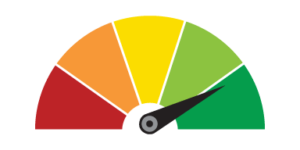
Credit scores were designed to measure the risk of default by taking into account various factors in a person’s financial history. These factors can be grouped into the following categories below (the percentages are the weights contributing to the FICO score*, the predominant credit score in the US). The credit reference agencies in the UK also follow a very similar model of scoring.
• payment history (35%)
• debt burden (30%)
• length of credit history (5%)
• types of credit used in the past (10%)
• recent searches for credit (10%)
• other, e.g. recently opened account, credit cards, etc. (10%)
*source: Wikipedia
Does the Past predict the Future?
The underlying popular maxim that the financial world seems to be going by is “The best predictor of future behaviour is… past behaviour”. The problem with this approach is that, a large majority of folks (non prime as they would be referred to) find themselves in a classic chicken and egg situation with seemingly no way out.
You will get credit or get credit at a reasonable rate of interest when your credit score improves. But how does one improve their credit scores if it is based on events that have happened in the past? One is supposed to build credit scores by taking out new credit and building a pattern of timely and full repayments. But with low credit scores most of the credit available for this purpose is at a very high rate of interest that is not sustainable for them….Hence the chicken and egg cycle continue worsening their scores further.
Employment as indicator of good credit.
While credit bureaus are trying to perfectly measure the credit worthiness by only looking at the historical payment patterns of an individual, they miss out on adding any variables that can help predict future behaviour independent of the past mistakes. There seems to be no second chances in the institutional finance world. FairQuid believes that there are a few important underlying factors, like employment history, income and expense pattern analysis beyond the standard ratios and job performance of the applicants (HR data around performance ratings and appraisal/promotion frequency). These additional employment factors explain someone’s ability to repay a loan in a timely manner and their overall future financial strength potential much better.
While steadily building up an intoxicated credit file during the crises times, a large segment of the society falls prey to payday lenders who are leveraging on the psychology by keeping the borrowers in their debt circle. The so called “lender sharks” are lending small ticket cash to survive until the next week and charging sky-high interests for this “weekend” cash.
All credit bureau scoring systems rely on previous credit histories and changes in personal details such as address of the borrower. How would they capture the risk to lending someone who just got employed in a new town, changed their address and want deliberately to come out of their financial debt circle? Or being trapped in an expensive debt spiral during the times of uncertainty, unemployment and personal crises like divorce?
FairQuid’s mission.
FairQuid’s mission is to challenge the toxic lending practices and make credit available for employees, by making their hard work and job performance count for them. The size of the income is only one aspect of the character of the employees, other qualitative measures such as length of service at the current employer, recent promotion and a bonus at the end of the year would also be a strong indicator about someone’s financial credibility.

